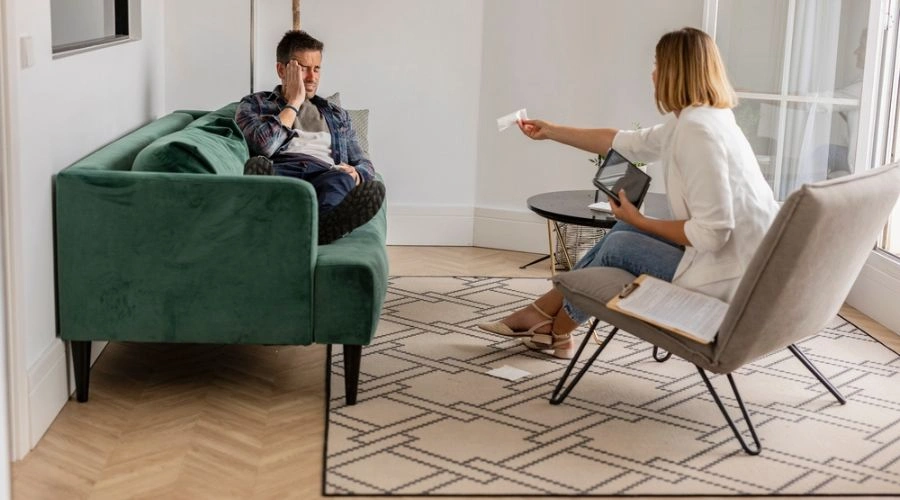Guidance on How to Start Changing Addictive Thought Processes
When you struggle with addiction, chances are your mind tells you at all hours of the day that it’s time to cope with hard situations using drugs and alcohol. This is known as addictive thinking, and it can keep you mired in the patterns of using substances. How can you stop these automatic thoughts in their tracks?
Addictive thinking tells you that your alcohol and drug use is normal and even expected under your unique circumstances. You can change it by acknowledging your self-deception, thinking about the consequences of drug use, and educating yourself on your triggers. Ground yourself, invest in your physical and mental well-being, and involve others who love you.
South Shores Recovery offers a robust option for helping you counteract addictive thinking patterns in our residential treatment program. We help you implement all of these strategies and more.
Keep reading to learn more about identifying these thoughts and how you can fight against them.
What are Addictive Thinking Patterns?
Do you struggle with addictive thinking patterns? These are normal thoughts that occur over the course of an addiction, but they are also thoughts that you want to eliminate. This type of thought pattern can encourage you to continue using drugs and alcohol simply by normalizing their use in your day-to-day life.
Addictive thinking occurs when you tell yourself that it’s perfectly acceptable to use alcohol or drugs to cope with a situation. They tell you that it’s okay not to consider the consequences of your alcohol and drug use. This only serves to continue to derail your recovery.
There are lots of different forms that this “stinking thinking” can take, but they all boil down to one thing in the end: denial of your condition. You don’t want to face a drug or alcohol addiction, and so you don’t. Your own thinking keeps you mired in substance abuse, but South Shores Recovery wants to help you gain deep psychological understanding.
Here are a few ways that you can start to think about addictive behaviors and the distorted thinking that leads to them.
Overcoming Addictive Thinking Patterns with Helpful Tools

A person’s character isn’t determined by their thoughts. However, addictive thinking can certainly take a toll on you. The good news is that you can combat these thought patterns with a few skills and tools.
To live life without them might be impossible, but you can certainly cope with them.
Understanding Self-Deception
One of the first keys to managing your addictive thinking is to understand self-deception. Anyone who engages in these patterns of thought has convinced themselves that there are no problems with their substance abuse. Self-deceptive thought keeps you stuck in addiction’s survival mechanisms, so it’s useful to take a realistic look at your behavioral patterns.
Consider all of the ways that an addicted person might pretend that they have all the answers. They might say that they don’t have a drinking problem because they never drink before lunch, or they can justify their drinking because they had a difficult day.
This destructive and terrifying illogic leads them to think they don’t have a problem, which perpetuates the cycle. Get clear on your substance use habits. If you have a hard time gaining clarity, ask loved ones for insight into your addictive behaviors.
Consider the Consequences
The second important thing that you can do to minimize addictive thinking is to take a moment to weigh the pros and cons of your actions. Most people will find that there are very few advantages to having a drink or using drugs. It might feel good for a short period of time, but then you’re stuck in the cycle.
Think about what your loved ones might think about your behavior. Will there be consequences for your relationships or your career? Will you be back to square one with the guilt that comes with relapse? Will you have negative feelings about your decision to use an hour or a day from now?
Substance use disorder is notoriously hard to deal with, but thinking about negative consequences can help you weigh whether substances will really and truly help your situation.
Educating Oneself About Triggers
Every person behaves the way they do, good or bad, because of triggers. If you know that a specific situation or person is going to trigger those addictive thinking patterns in you, then it would be best to avoid those situations altogether. Putting yourself in precarious situations can undermine self-esteem when you inevitably give in to temptation.
As you gain more practice with your sobriety, you may be able to experience some of these triggers with the reassurance that you know how much better life is sober. But in the early days, learning what triggers you to use substances and avoiding it is key.
Center Yourself with Grounding Techniques

Once those addictive thoughts start to pour in, you may need intense resistance not to give in to them. They can border on obsessive thoughts, all with that same brand of addictive illogic. Many addicts find that the mindfulness skills they learn in recovery are particularly helpful for stopping thoughts in their tracks.
Turn off your thinking brain for a minute and try to get insight into the negative change in your thoughts. If you can center yourself right now, you can see a way out of the patterns.
Close your eyes and name the things you can see, hear, smell, touch, and feel right now. Take a deep breath and pay attention to the moment, nothing more.
Once you have centered yourself, you may find that this moment is bearable, and the irrational thought will disappear.
Invest in Your Wellbeing
Investing in yourself is one way to gain great insight into what you truly need. This doesn’t have to be a financial investment but rather an investment of your time and energy. First, you can invest in the health of your physical body. You might take complementary therapies in rehab seriously and practice yoga or mindfulness meditation.
Exercise can be a great way to cope with substance abuse.
You can also invest in your mental health. By enrolling in a program, recovering individuals learn new ways of thinking and develop positive patterns rather than using other drugs to cover up one issue or another.
Get Family Members Involved
As your substance use disorder undergoes significant change, your family members and close loved ones might notice your abnormal behavior more and more. When you start to notice those addictive thoughts creeping in again, take them to a trusted person who can help you hold space without giving in.
When you enroll in a rehab, many programs will offer family-based therapy. Once you graduate from a treatment facility, your family and friends are going to be your built-in support system. Involving them and teaching them how they should handle addictive thinking can give you another layer of support.
Getting Professional Help for a Rewarding Recovery

In many instances, it requires professional help for addicts to control this type of negative thinking. You might have hit rock bottom, but you may still have a long way to go before you are ready to embrace a life without drugs and alcohol. At South Shores Recovery, we offer a variety of therapies to help.
Dialectical Behavior Therapy for Mindfulness and Distress Tolerance
When you’re faced with a situation where you would have turned to substance abuse before, you might find that your new sober life leads to distress. Sitting with the discomfort of knowing you want a drink can feel impossible without some coping skills in place. Dialectical behavior therapy fills the gaps and helps you tolerate these moments.
You will practice mindfulness with your clinicians as part of your distress tolerance training. This allows you to anchor yourself in the present moment, which offers hope for addicts who can’t seem to find the way forward without drugs and alcohol.
Cognitive Behavior Therapy for Changing Actions
The most important thing you might learn in therapy is that your thoughts and feelings influence your actions. If you can interrupt patterns when they are just at the thoughts and feelings stage, then you may be able to overwrite your habits. Cognitive behavior therapy allows you to look at this triad and make changes.
One of the key things you’ll learn in CBT is that some of your thinking may be distorted. Instead of allowing those distorted thoughts to live in your head rent-free, your therapist will help you challenge them and replace them with healthier thoughts.
It won’t be second nature to you right away. But with time and repetition, you’ll eventually see those old addictive thoughts come up less and less.
Consider Residential Treatment for Obsessive Thoughts

Are you struggling with addictive thoughts that feel nonstop, and you aren’t sure what to do with them? If you think that you might give in to those old patterns without help, it might be time to enroll in South Shores Recovery’s residential treatment program.
A residential treatment program allows you to have around-the-clock access to care and a safe space to process some of these thoughts. We’ll help you find a comprehensive treatment plan that targets your unique issues with individual therapy, group counseling, and complementary therapies like yoga, surfing, art therapy, and more.
While you reside with us, you are in no danger of using substances, regardless of how urgent those old thought patterns might feel.
Contact South Shores Recovery for Enrollment Today
When you feel ready to embrace a sober lifestyle and aren’t sure how to take those first steps toward a long and lasting recovery, South Shores Recovery is here to help. Our enrollment team can answer any of your questions, verify your insurance benefits, and get you enrolled in our luxurious rehab center.
We’ll offer you 24/7 care, giving you the peace of mind that comes with knowing that you won’t give in to these addictive thinking patterns. Relax, unwind, and allow us to meet your needs while you focus on your recovery.
Call us today to learn more about our program and see if it’s the right fit for you!


Recent Comments